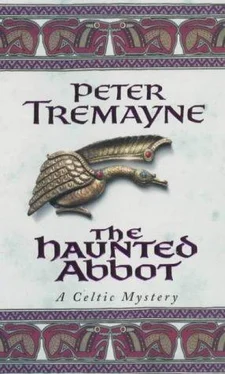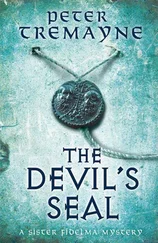Peter Tremayne - The Haunted Abbot
Здесь есть возможность читать онлайн «Peter Tremayne - The Haunted Abbot» весь текст электронной книги совершенно бесплатно (целиком полную версию без сокращений). В некоторых случаях можно слушать аудио, скачать через торрент в формате fb2 и присутствует краткое содержание. Жанр: Исторический детектив, на английском языке. Описание произведения, (предисловие) а так же отзывы посетителей доступны на портале библиотеки ЛибКат.
- Название:The Haunted Abbot
- Автор:
- Жанр:
- Год:неизвестен
- ISBN:нет данных
- Рейтинг книги:5 / 5. Голосов: 1
-
Избранное:Добавить в избранное
- Отзывы:
-
Ваша оценка:
- 100
- 1
- 2
- 3
- 4
- 5
The Haunted Abbot: краткое содержание, описание и аннотация
Предлагаем к чтению аннотацию, описание, краткое содержание или предисловие (зависит от того, что написал сам автор книги «The Haunted Abbot»). Если вы не нашли необходимую информацию о книге — напишите в комментариях, мы постараемся отыскать её.
The Haunted Abbot — читать онлайн бесплатно полную книгу (весь текст) целиком
Ниже представлен текст книги, разбитый по страницам. Система сохранения места последней прочитанной страницы, позволяет с удобством читать онлайн бесплатно книгу «The Haunted Abbot», без необходимости каждый раз заново искать на чём Вы остановились. Поставьте закладку, и сможете в любой момент перейти на страницу, на которой закончили чтение.
Интервал:
Закладка:
Eadulf turned to Fidelma with triumph, although a closer observer might have noticed a predominance of relief in his eyes.
‘Tunstall. This is Tunstall. We have reached safety.’
Fidelma, her breath almost gone in the icy cold dusk of early evening, simply nodded.
There came a warning shout across the clearing. They had been spotted. Several men emerged from the buildings, most clad in the robes of religious and most wearing the tonsure of the Blessed John.
As Eadulf and Fidelma began to walk across the clearing towards what Eadulf presumed was the main building of the settlement, Eadulf noticed a small group of warriors. They were clearly not Saxons and Eadulf felt a surge of relief as he realised that he had been right. He did not doubt that these were Garb’s men. He felt a quickening of his pulse as he thought that soon the mystery of the death of his friend Botulf might be explained.
He halted, for one of the warriors had given a cry and was running towards him with an upraised sword.
A religious was also running forward as if to intercept the warrior, who skidded to a halt a sword’s length away. To his surprise, Eadulf saw that his antagonist was Garb himself.
‘Stand back, Brother,’ Garb cried in Irish to the religieux, who had come to a halt next to him and was looking bewildered. ‘This man is one of Cild’s evil brood. I recognise him. He was in Cild’s abbey when I delivered the ultimatum. It means that murdering abbot has tracked us down. Stand back while I kill them, and then we must be prepared to abandon this place.’
Chapter Eleven
‘Put up your sword, Garb of Maigh Eo! We are not members of Abbot Cild’s fraternity,’ snapped Eadulf.
Garb sneered in disbelief. ‘I saw you among the brethren, Saxon. You are a liar!’
‘He does not lie!’ Eadulf suddenly found Fidelma had stepped between him and the Connacht warrior, her hand raised, palm outward. ‘I am Fidelma of Cashel. Put up your sword, Garb. You would not wish to kill innocent people!’
Garb had actually started to swing his sword back and now he hesitated, momentarily confused.
‘I said, put up your sword,’ ordered Fidelma once again, ‘unless you wish to kill an advocate of the Laws of the Fénechus and a king’s daughter.’
The warrior examined her closely with narrowed eyes. Then he slowly began to lower his sword.
‘You say that you are Fidelma of Cashel?’ It was the religieux at his side who spoke. ‘Are you Fidelma the dálaigh, the advocate who solved the mysterious theft of the High King’s sword?’
‘I am Fidelma the dálaigh,’ she confirmed without embellishment.
The religieux now regarded her with an expression of surprise mingled with awe. He was a man of middle years, his grey hair shaven in the style of the Irish tonsure. His face was still handsome, commanding, with dark eyes and a firm mouth.
‘Are you Fidelma, sister to King Colgú?’
‘I am.’
‘What are you doing here, in this place, and with this Saxon?’ demanded Garb gruffly. His sword was lowered but still held in his hand. ‘I saw him in the abbey run by Cild only two nights ago. How is it that he claims not to be one of Cild’s men?’
‘I was also in that abbey, Garb,’ she said to him. ‘BrotherEadulf is my companion and emissary of Archbishop Theodore of Canterbury. We were guests there, having just arrived that night. I was ill and Brother Eadulf here was attending the funeral rites of his friend, Brother Botulf, when you made your unorthodox entrance.’
Garb frowned suddenly. ‘Was Botulf your friend?’
‘He was a friend of Brother Eadulf,’ confirmed Fidelma. ‘So perhaps you should think with your head instead of with your sword hand.’
Garb was still suspicious.
‘What are you doing here? Did Cild send you?’
Fidelma gave an impatient gesture with her hand.
‘He did not. We became prisoners in the abbey. Cild planned my execution and we thought it wise not to wait for it. Because of the remarks about Botulf which you made to Cild in the abbey chapel, Brother Eadulf and I came in search of you. You are not hard to find.’
The religieux came forward with hands outstretched, ignoring the petulant warrior.
‘I am Brother Laisre. I am leader of this small religious group here and I would bid you welcome, Fidelma of Cashel. Welcome to Tunstall. I welcome your companion also. Let us go in by the fire so that we may hear your story and why your footsteps have been guided here.’
They followed Brother Laisre to one of the wooden buildings, with Garb following, his sword now sheathed, although he still regarded Eadulf menacingly. The warmth in the building was a welcome contrast to the chill of the dusk outside. It was clear that the early evening meal was being prepared for several religieux were busy about various tasks and there was an aromatic smell emanating from a steaming cauldron of stew which simmered over the fire.
‘You will be our guests here for as long as you like, Fidelma of Cashel,’ said Brother Laisre, smiling. He turned to Eadulf and began to translate what he had said into Saxon but Eadulf sniffed impatiently.
‘I have studied in the island of the five kingdoms,’ he said brusquely. ‘I speak your language fluently.’
Brother Laisre looked relieved.
‘It is good to have a language in common,’ he observed, indicating that they should be seated.
Fidelma was glancing round, noting the small scriptorum at the far end of the room. In fact, the building seemed to act as a general refectory and library for the entire community.
‘I am surprised to find that there is still a community in this land which cleaves to the rituals of our Church, Brother Laisre,’ she commented. ‘I thought that after the decision of Whitby whereby the Angles and the Saxons opted to follow the Rule of Rome, all our clergy had departed from these lands.’
Brother Laisre grimaced humorously. ‘Some of us made the decision not to give in without trying to save some of our principles. Oh, I know after Whitby, Abbot Colman led many of the Irish missionaries and those Angles and Saxons who were of like mind to the island of the white cow — Inis Bó Fin — off the coast of Connacht. Some of them — mostly the Angles and Saxons — set up another centre on the mainland which is called “Maigh Eo of the Saxons”. But we refused to follow Colman and retreat from this land and accept the defeat of our cause. So here we remain — missionaries from the five kingdoms — trying to spread the great truth.’
He turned and regarded Brother Eadulf’s tonsure, the tonsure of Peter, which indicated his acceptance of the Roman Rule.
‘I see that you, Brother, do not follow our path?’
Eadulf shrugged. ‘Not in all specifics. But there is more to unite us than the little which divides us. Like Sister Fidelma, I was in attendance at the great council at Whitby. If we believe in the one God, then there is room for all our ways of worship.’
Brother Laisre frowned briefly. ‘I would not agree with that. Had I thought that the revisions of the faith made by the bishops of Rome were right then I would no longer dwell in this inhospitable land but take me back to my own green valleys by the great river An tSiona.’
Fidelma cleared her throat. She did not want to get sidetracked into arguments of theology and liturgy.
‘I presume that this is where Gadra, the chieftain of Maigh Eo, will be carrying out the troscud?’
Garb started forward. ‘How …?’ His eye fell on Eadulf and he relaxed then. ‘I see. You are clever, Fidelma.’
Fidelma shook her head.
‘It was Brother Eadulf who made the deduction. The point is, does your father Gadra realise that Cild does not even respect the laws of his own people and is far less likely to respect the laws of our people? He would be throwing his life away unnecessarily.’
Читать дальшеИнтервал:
Закладка:
Похожие книги на «The Haunted Abbot»
Представляем Вашему вниманию похожие книги на «The Haunted Abbot» списком для выбора. Мы отобрали схожую по названию и смыслу литературу в надежде предоставить читателям больше вариантов отыскать новые, интересные, ещё непрочитанные произведения.
Обсуждение, отзывы о книге «The Haunted Abbot» и просто собственные мнения читателей. Оставьте ваши комментарии, напишите, что Вы думаете о произведении, его смысле или главных героях. Укажите что конкретно понравилось, а что нет, и почему Вы так считаете.











